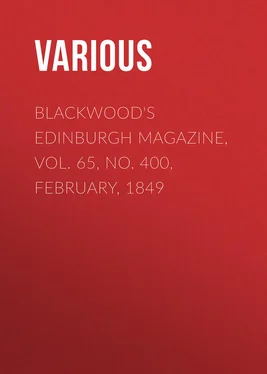Various - Blackwood's Edinburgh Magazine, Vol. 65, No. 400, February, 1849
Здесь есть возможность читать онлайн «Various - Blackwood's Edinburgh Magazine, Vol. 65, No. 400, February, 1849» — ознакомительный отрывок электронной книги совершенно бесплатно, а после прочтения отрывка купить полную версию. В некоторых случаях можно слушать аудио, скачать через торрент в формате fb2 и присутствует краткое содержание. Издательство: Иностранный паблик, Жанр: periodic, foreign_edu, Путешествия и география, на английском языке. Описание произведения, (предисловие) а так же отзывы посетителей доступны на портале библиотеки ЛибКат.
- Название:Blackwood's Edinburgh Magazine, Vol. 65, No. 400, February, 1849
- Автор:
- Издательство:Иностранный паблик
- Жанр:
- Год:неизвестен
- ISBN:нет данных
- Рейтинг книги:4 / 5. Голосов: 1
-
Избранное:Добавить в избранное
- Отзывы:
-
Ваша оценка:
- 80
- 1
- 2
- 3
- 4
- 5
Blackwood's Edinburgh Magazine, Vol. 65, No. 400, February, 1849: краткое содержание, описание и аннотация
Предлагаем к чтению аннотацию, описание, краткое содержание или предисловие (зависит от того, что написал сам автор книги «Blackwood's Edinburgh Magazine, Vol. 65, No. 400, February, 1849»). Если вы не нашли необходимую информацию о книге — напишите в комментариях, мы постараемся отыскать её.
Blackwood's Edinburgh Magazine, Vol. 65, No. 400, February, 1849 — читать онлайн ознакомительный отрывок
Ниже представлен текст книги, разбитый по страницам. Система сохранения места последней прочитанной страницы, позволяет с удобством читать онлайн бесплатно книгу «Blackwood's Edinburgh Magazine, Vol. 65, No. 400, February, 1849», без необходимости каждый раз заново искать на чём Вы остановились. Поставьте закладку, и сможете в любой момент перейти на страницу, на которой закончили чтение.
Интервал:
Закладка:
1 1 "It must be admitted that Russian officers are second to those of no other nation, in thirst for distinction, and in honourable ambition, to awaken and stimulate which, innumerable means are employed. In no other army are the rewards for those officers who distinguish themselves in the field of so many kinds, and so lavishly dealt out. There are all manner of medals and marks for good service – crosses and stars of Saints George, Stanislaus, Vladimir, Andrew, Anna, and other holy personages; some with crowns, some with diamonds, peculiar distinctions on the epaulets and uniforms, &c. &c. I was once in a distinguished society, composed almost entirely of officers of the army of the Caucasus. Not finding very much amusement, I had the patience to count all the orders and decorations in the room, and found that upon the breasts of the thirty-five military guests, there glittered more than two hundred stars, crosses, and medals; on some of the generals' coats were more orders than buttons. As it usually happens, the desire for these distinctions increases with their possession. The Russian who has obtained a medal leaves no stone unturned to get a knight's cross, and when the cross is at his button-hole, he is ravenous for the glittering star, and ready to make any sacrifice to obtain it." — Der Kaukasus , &c., vol. ii. p. 98.Thus, in 1845, Count Woronzoff made a most daring expedition into the heart of Daghestan. He found the villages empty and in flames, lost three thousand men, amongst them many brave and valuable officers, and marched back again, strewing the path with wounded, for whom the means of transport (the horses of the Cossack cavalry) were quite insufficient. With great difficulty, and protected by a column that went out to meet them, the Russians regained their lines, harassed to the last by the fierce Caucasians. This affair was called a victory, and Count Woronzoff was made a prince. Two more such victories would have reduced his expeditionary column to a single battalion. Chamyl, who had cannonaded the Russians with their own artillery, captured in former actions, possibly considered himself equally entitled to triumph, as he slowly retreated, after following up the foe nearly to the gates of their fortresses, into the recesses of his native valleys.
2 2 "Amongst the Caucasian tribes, the interest of Europe has attached itself especially to the Circassians, because they are regarded (in Urquhart's words) 'as the only people, from the Atlantic to the Indian Ocean, ever ready to revenge an injury and retort a menace proceeding from the Czar of the Muscovites.' Urquhart's opinion, which is shared by the great majority of the European public, is not quite correct, the Circassians not being the only combatants against Russia. Indeed it so happens that, for the last four years, they have kept tolerably quiet in their mountains, contenting themselves with small forays into the Cossack country on the Kuban; whilst the warlike Tshetshens in the eastern Caucasus, their chief, Chamyl, at their head, have given the Russian army much more to do. But, in the absence of official intelligence, and of regular newspaper information concerning the events of the war, people in Europe have got accustomed to admire and praise the Circassians as the only defenders of Caucasian freedom against Russian aggression; and even in St Petersburg the intelligent public hold the famous Chamyl to be chief of the Circassians, with whom he has nothing whatever to do." — Der Kaukasus , &c., vol. ii. p. 22-3.
The interior of Circassia is still an unknown land. The investigations of Messrs Bell, Longworth, Stewart, and others, who of late years have visited and written about the country, were confined to small districts, and cramped by the jealousy of the natives. Mr Bell, who made the longest residence, was treated more like a prisoner than a guest. Other foreigners find a worse reception still. Even the Poles, who desert from the Russian army, are made slaves of by the Circassians, and so severely treated that they are often glad to return to their colours, and endure the flogging that there awaits them. The only European who, having penetrated into the interior, has again seen his own country, is the Russian Baron Turnau, an aide-de-camp of General Gurko; but the circumstances of his abode in Circassia were too painful and peculiar to allow opportunity for observation. They are well told by Dr Wagner.
"By the Emperor's command, Russian officers acquainted with the language are sent, from time to time, as spies into Circassia, 3 3 The reference in this instance is more particularly to the land of the Ubiches and Tchigetes, two tribes that abide south of Circassia Proper, and whose language differs from those of the Circassians and Abchasians, their neighbours to the north and south. The general medium of conversation amongst the various Caucasian tribes is the Turkish-Tartar dialect, current amongst most of the dwellers on the shores of the Black and Caspian Seas.
– partly to make topographical surveys of districts previously unknown; partly to ascertain the numbers, mode of life, and disposition of those tribes with whom no intercourse is kept up. These missions are extremely dangerous, and seldom succeed. Shortly before my arrival at Terek, four Russian staff-officers were sent as spies to various parts of Lesghistan. They assumed the Caucasian garb, and were attended by natives in Russian pay. Only one of them ever returned; the three others were recognised and murdered. Baron Turnau prepared himself long beforehand for his dangerous mission. He gave his complexion a brownish tint, and to his beard the form affected by the aborigines. He also tried to learn the language of the Ubiches, but, finding the harsh pronunciation of certain words quite unattainable, he agreed with his guide to pass for deaf and dumb during his stay in the country. In this guise he set out upon his perilous journey, and for several days wandered undetected from tribe to tribe. But one of the works (nobles) under whose roof he passed a night, conceived suspicions, and threatened the guide, who betrayed his employer's secret. The baron was kept prisoner, and the Ubiches demanded a cap-full of silver for his ransom from the Russian commandant of Fort Ardler. When this officer declared himself ready to pay, they increased their demand to a bushel of silver rubles. The commandant referred the matter to Baron Rosen, then commander-in-chief of the army of the Caucasus; the baron reported it to St Petersburg, and the Emperor consented to pay the heavy ransom. But Rosen represented it to him as more for the Russian interest to leave Turnau for a while in the hands of the Ubiches; for, in the first place, the payment of so large a sum was a bad precedent, likely to encourage the mountaineers to renew the extortion, instead of contenting themselves, as they previously had done, with a few hundred rubles; and, secondly, as a prisoner, Baron Turnau would perhaps have opportunities of gathering valuable information concerning a country and people of whom little or nothing was known. The unfortunate young officer was cruelly sacrificed to these considerations, and passed a long winter in terrible captivity, tortured by frost and hunger, compelled, as a slave, to the severest labour, and often greatly ill-treated. Several attempts at flight failed; and at last the chief, in whose hands he was, confined him in a cage half-buried in the ground, and withal so narrow that its inmate could neither stand upright nor lie at length."
Интервал:
Закладка:
Похожие книги на «Blackwood's Edinburgh Magazine, Vol. 65, No. 400, February, 1849»
Представляем Вашему вниманию похожие книги на «Blackwood's Edinburgh Magazine, Vol. 65, No. 400, February, 1849» списком для выбора. Мы отобрали схожую по названию и смыслу литературу в надежде предоставить читателям больше вариантов отыскать новые, интересные, ещё непрочитанные произведения.
Обсуждение, отзывы о книге «Blackwood's Edinburgh Magazine, Vol. 65, No. 400, February, 1849» и просто собственные мнения читателей. Оставьте ваши комментарии, напишите, что Вы думаете о произведении, его смысле или главных героях. Укажите что конкретно понравилось, а что нет, и почему Вы так считаете.












